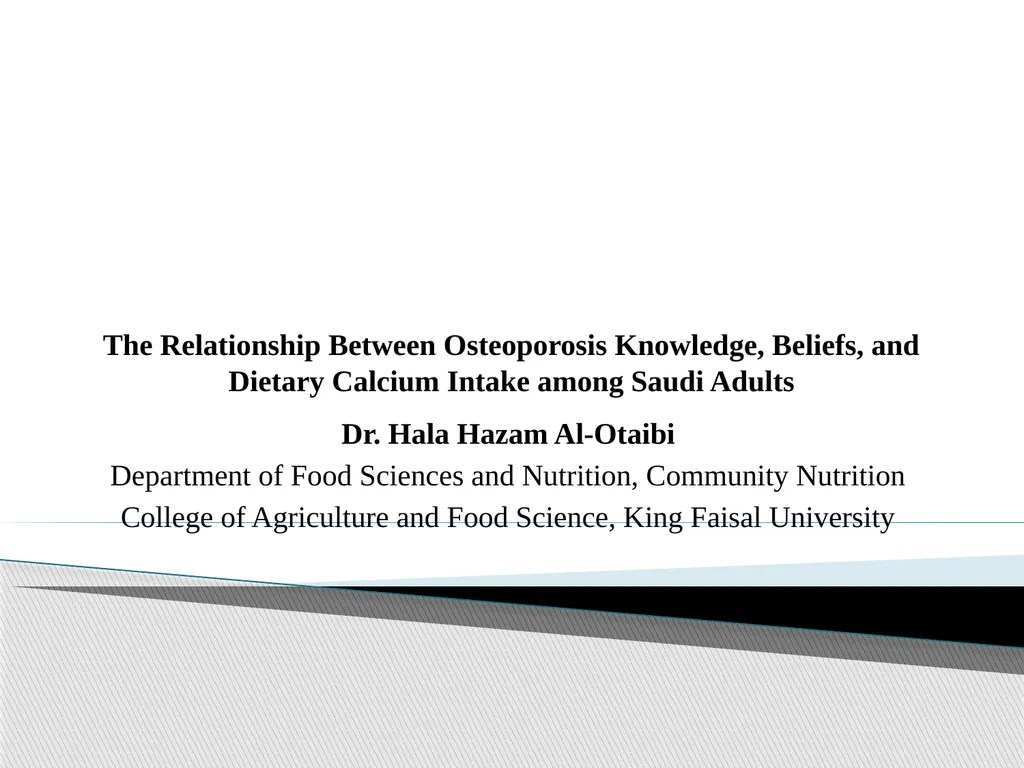Dr. Hala Hazam Al-Otaibi Department of Food
Author : conchita-marotz | Published Date : 2025-05-23
Description: Dr Hala Hazam AlOtaibi Department of Food Sciences and Nutrition Community Nutrition College of Agriculture and Food Science King Faisal University The Relationship Between Osteoporosis Knowledge Beliefs and Dietary Calcium Intake
Presentation Embed Code
Download Presentation
Download
Presentation The PPT/PDF document
"Dr. Hala Hazam Al-Otaibi Department of Food" is the property of its rightful owner.
Permission is granted to download and print the materials on this website for personal, non-commercial use only,
and to display it on your personal computer provided you do not modify the materials and that you retain all
copyright notices contained in the materials. By downloading content from our website, you accept the terms of
this agreement.
Transcript:Dr. Hala Hazam Al-Otaibi Department of Food:
Dr. Hala Hazam Al-Otaibi Department of Food Sciences and Nutrition, Community Nutrition College of Agriculture and Food Science, King Faisal University The Relationship Between Osteoporosis Knowledge, Beliefs, and Dietary Calcium Intake among Saudi Adults Osteoporosis is a disease characterized by decreased bone density and loss of bone micro architecture quality which in turn lead to an increased risk of fracture. (WHO,2003) It was also reported as the fourth main enemy of the human after heart failure, stroke and cancer, and the most common cause of fractures in the world (WHO,2003). The present population in Saudi Arabia is estimated to be 25.7 million, of this 10% (2.5 million) is 50 years of age or over and 2% (450 000) is 70 or over. By 2050, it is estimated that 31% (12.3 million) of the population will be 50 or over and 8% (3.2 million) will be 70 or over while the total population will increase to 40 million. Magnitude of the Problem A systematic review for 36 local published articles by Mir Sadat et al (2012) indicate that the prevalence of low bone mass (osteoporosis and osteopenia) in Saudi Arabia is 70.5% in men and women with an average age of 56 years. The prevalence of osteoporosis among women 34% and in men 30.7%. Osteoporosis on increase due to the changes in lifestyle and diet habits of Saudis to be more westernized. It is preventable disease when we identifying factors affecting diet and lifestyle behavior change, then we can make changes easier to maintain bone mass and strength in young people and adults. Also awareness about the disease can helps in prevention. Using theories and models helps researchers to understand the dietary and life style behavior of people. One of the more popular models effective in health education and promotion is the Health Belief Model (HBM). Based on HBM, people change their behavior when they understand that the disease is serious otherwise they might not turn to healthy behaviors. (Edmonds etal,2012; Barzanji etal,2013; Jeihooni etal,2014). The present study aimed to determine osteoporosis knowledge, health believes and calcium intake among Saudi adults. To assess the HBM constructs and their relationship to calcium intake. Study objectives Study design A descriptive web-based survey. Study population Subjects were invited to participate in a web-based survey by email letter. The letter was sent to an initial group of 46 adults known to the researcher, inviting them














